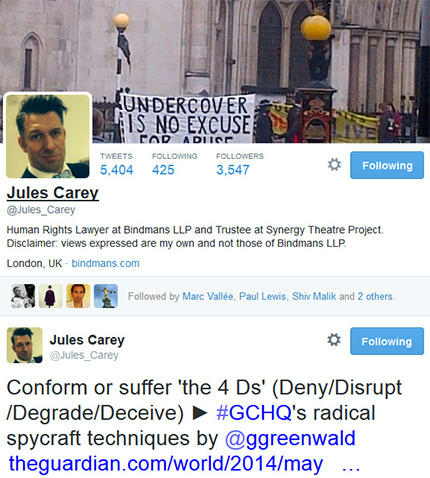DAY 67 UKA DBS check: Declan has to raise an Escalation with the Metropolitan Police if he wants to keep volunteering with children and adults with learning disabilities (WITH UPDATE - DAY 68 7/8/2018)
What a breakthrough! [A Case for Neural Augmentation]
Your site is becoming so powerful!
Congratulations
-Don Collins, President of ISAF, an NGO dedicated to helping women
Our Church and State website has no less than 40 Nobel Prize winners on it; for details, see this blog's sidebar under "Church and State" (updated today).
Article 10 of the European Convention on Human Rights and Fundamental Freedoms formulates what is the core of free speech. "Everyone has the right to freedom of expression." In an important interpretation of this article, the European Court of Human Rights in Handyside v. UK (1976) indicated that this "freedom of expression" should be construed as follows. It "is applicable not only to 'information' or 'ideas' that are favourably received, or regarded as inoffensive, or as a matter of indifference, but also to those that offend, shock or disturb the State or any sector of the population." Such are the demands of that pluralism, tolerance and broadmindedness without which there is no "democratic society" (see Cliteur, 2010).
Declan is a former physical education teacher, who has taught in one of Ireland's top schools (Glenstal Abbey). Last June he qualified as an assistant coach with UK Athletics. He is currently volunteering twice a week with children and adults with learning disabilities. This morning he tried raising an Escalation regarding his UK Athletics Disclosure and Barring Service (DBS) check. Right off the bat, he had to make a formal complaint to DBS Complaints because he didn't receive the activation code on a new online account that would allow him to track a complaint. He has subsequently written to DBS Customer Services and has asked them for confirmation that an escalation has today been sent to the police force.
1 June 2016
Declan
Your Verification form and payment has been processed; your application has been sent to the DBS for checking.
Please note that the DBS checking process can take 21 days and more in some circumstances.
UKA have no control over how long the DBS checking process takes; confirmation and clearance must be obtained from various agencies and organisations as part of the Enhanced DBS process.
Regards,
Steve Gordon
Welfare Administrator
UK Athletics
DAY 68 UPDATE 7 August (9.28am): Nothing from the DBS except the activation code, which Declan received yesterday afternoon. DBS say that if the police force doesn't respond to their escalation on or before 15 August (within 10 days), they will tell Declan which police force it is with. Then it is up to Declan to directly chase up the original application made by UK Athletics himself until it is complete. Great!
6 August 2018
Dear DBS,
This morning I telephoned DBS. I was assured that an Escalation would be raised with the police force today.
Please can you confirm that an escalation has been sent to the police force.
Yours sincerely,
Declan Heavey
This morning I updated my blog post of 27 June, SITE BLOCKS: The blocks on access to our Church and State website continue unabated (WITH UPDATE 7/8/2018: re 1,287th block since 26 July 2016). The blog post also reveals the daily targeting to fluctuating degrees of category pages throughout Church and State which continues to this day. For example, the second article below has over 1/2 million Facebook likes/shares (not zero):


Re: Government Communications Headquarters (GCHQ)
Paragraph 12 of Declan's updated complaint to the United Nations under Article 19 (freedom of expression) of the International Covenant on Civil and Political Rights.
12. It is important to underscore that the discriminatory surveillance suffered by the Applicant and his wife is not an isolated event. Rather, it is emblematic of a larger pattern of surveillance by law enforcement officials in the UK that has been well-documented by international and domestic human rights bodies. For example, GCHQ's Joint Threat Research Intelligence Group (JTRIG) specialises in the "4 D's": deny, disrupt, degrade, deceive. It has been branded by the press as the spy agency's "deception unit". Though its existence was secret until 2014, JTRIG has developed a distinctive profile in the public understanding, after documents from NSA whistleblower Edward Snowden revealed that the unit had engaged in "dirty tricks" like deploying sexual "honey traps" designed to discredit targets, launching denial-of-service attacks to shut down Internet chat rooms, pushing veiled propaganda onto social networks and generally warping discourse online. Previous reporting on GCHQ established its focus on what it regards as political radicalism. Beyond JTRIG's targeting of Anonymous, other parts of GCHQ targeted political activists and groups deemed to be "radical", even monitoring human rights NGOs. Simon Davies, founder of the London-based Privacy International, asks: "If spying on human rights NGOs isn't off limits for GCHQ, then what is?"
Paragraph 12 of Declan's updated complaint to the United Nations under Article 19 (freedom of expression) of the International Covenant on Civil and Political Rights.
12. It is important to underscore that the discriminatory surveillance suffered by the Applicant and his wife is not an isolated event. Rather, it is emblematic of a larger pattern of surveillance by law enforcement officials in the UK that has been well-documented by international and domestic human rights bodies. For example, GCHQ's Joint Threat Research Intelligence Group (JTRIG) specialises in the "4 D's": deny, disrupt, degrade, deceive. It has been branded by the press as the spy agency's "deception unit". Though its existence was secret until 2014, JTRIG has developed a distinctive profile in the public understanding, after documents from NSA whistleblower Edward Snowden revealed that the unit had engaged in "dirty tricks" like deploying sexual "honey traps" designed to discredit targets, launching denial-of-service attacks to shut down Internet chat rooms, pushing veiled propaganda onto social networks and generally warping discourse online. Previous reporting on GCHQ established its focus on what it regards as political radicalism. Beyond JTRIG's targeting of Anonymous, other parts of GCHQ targeted political activists and groups deemed to be "radical", even monitoring human rights NGOs. Simon Davies, founder of the London-based Privacy International, asks: "If spying on human rights NGOs isn't off limits for GCHQ, then what is?"
Is Edward Snowden a Hero or Criminal? This is a solid documentary called #Citizenfour that may influence your thinking either way:
JOIN THE CONVERSATION #CITIZENFOUR
From My Picks:
8 May 2018: Threat to life: Updated complaint to the United Nations under Article 19 (freedom of expression) of the International Covenant on Civil and Political Rights. Today we are cut off the internet for a half an hour
http://churchandstate.org.uk/honorary-associates/

